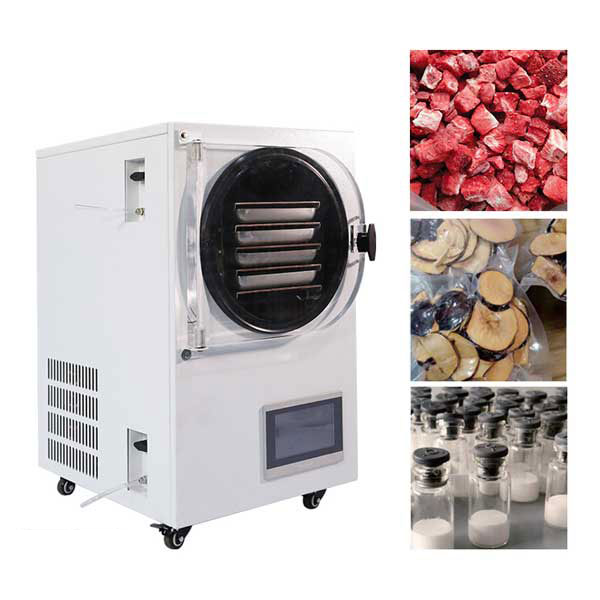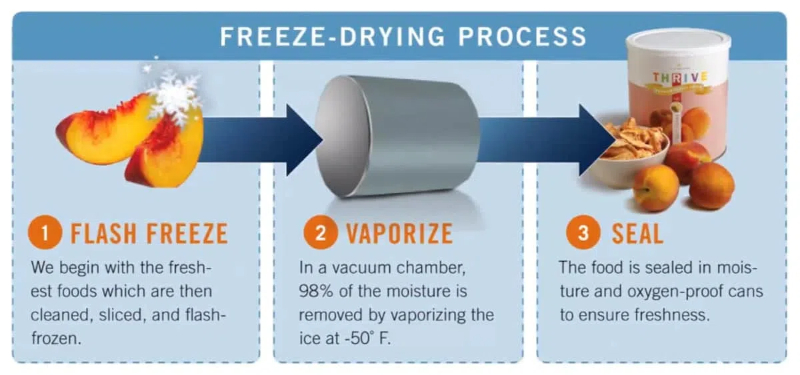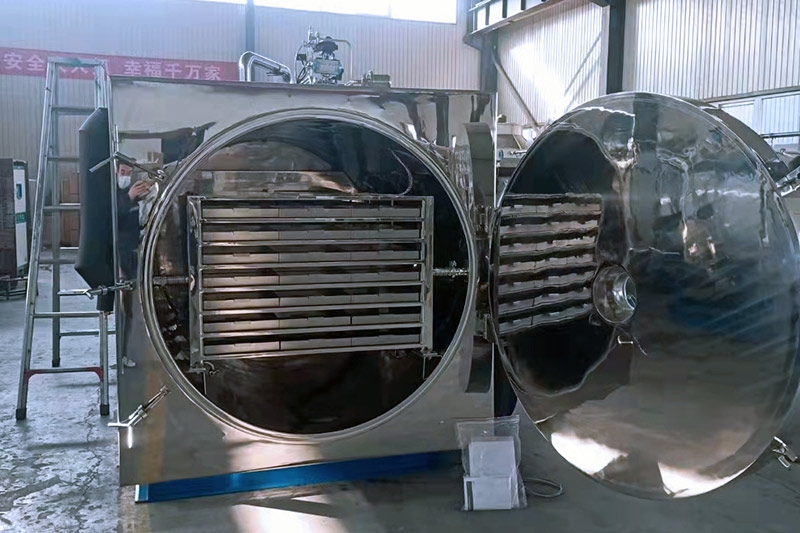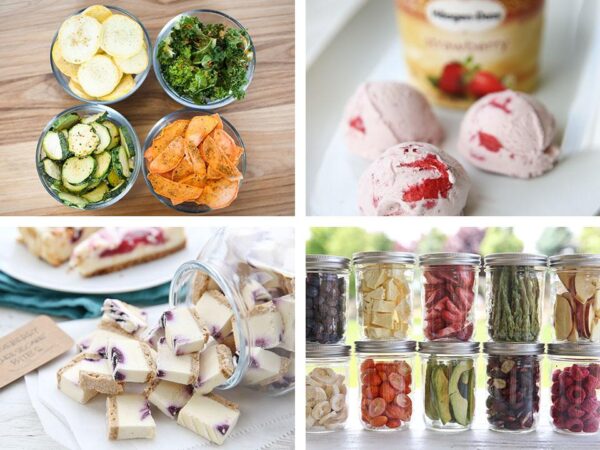
Content Menu
● Introduction to Food Freeze Drying Technology
● Understanding the Range of Food Freeze Drying Machine Prices
>> Home Freeze Dryers
>> Commercial Freeze Dryers
● Factors Influencing Food Freeze Drying Machine Prices
>> 1. Capacity
>> 2. Technology and Features
>> 3. Brand Reputation
>> 4. Materials and Build Quality
>> 5. Energy Efficiency
● Comparing Popular Food Freeze Drying Machine Brands and Prices
>> Harvest Right
>> Labconco
>> VirTis
● Budget-Friendly Alternatives to Buying a Food Freeze Drying Machine
>> 1. Rental Options
>> 2. Community Co-ops
>> 3. DIY Freeze Drying Methods
● Calculating the ROI of a Food Freeze Drying Machine
>> 1. Food Waste Reduction
>> 2. Cost of Freeze-Dried Foods
>> 3. Energy Costs
>> 4. Maintenance and Replacement Parts
● Tips for Finding the Best Deals on Food Freeze Drying Machines
>> 1. Wait for Sales
>> 2. Look for Refurbished Models
>> 3. Compare Prices Across Multiple Retailers
>> 4. Consider Financing Options
● The Future of Food Freeze Drying Machine Prices
>> 1. Increased Competition
>> 2. Technological Advancements
>> 3. Economies of Scale
● Conclusion: Is the Price of a Food Freeze Drying Machine Worth It?
● Frequently Asked Questions
>> 1. How much does it cost to operate a food freeze drying machine?
>> 2. Are there any ongoing costs associated with owning a food freeze drying machine?
>> 3. How long does a food freeze drying machine typically last?
>> 4. Can I make money with a food freeze drying machine to offset its cost?
>> 5. Are there any alternatives to buying a new food freeze drying machine?
Introduction to Food Freeze Drying Technology
In recent years, the popularity of food preservation has skyrocketed, with more people looking to extend the shelf life of their food while maintaining its nutritional value. Among the various preservation methods, freeze drying has emerged as a superior technique, and the food freeze drying machine has become a coveted appliance for both home users and small businesses. However, one of the most significant factors influencing the decision to purchase a freeze dryer is the price. In this comprehensive guide, we'll explore the world of food freeze drying machine prices, helping you make an informed decision about this significant investment.
Understanding the Range of Food Freeze Drying Machine Prices
The price of a food freeze drying machine can vary widely depending on several factors, including size, capacity, features, and whether it's designed for home or commercial use. Let's break down the price ranges you can expect to encounter:
Home Freeze Dryers
Home freeze dryers are typically more affordable and designed for personal or family use. Prices for these units generally range from:
- Entry-level models: $2,000 to $3,000
- Mid-range models: $3,000 to $4,500
- High-end home models: $4,500 to $7,000
Commercial Freeze Dryers
Commercial freeze dryers, designed for small businesses or large-scale operations, come with a heftier price tag:
- Small commercial units: $10,000 to $20,000
- Medium-sized commercial units: $20,000 to $50,000
- Large industrial freeze dryers: $50,000 to $200,000+
Factors Influencing Food Freeze Drying Machine Prices
Several key factors contribute to the wide range of prices in the freeze drying market:
1. Capacity
The amount of food a machine can process in a single batch significantly affects its price. Larger capacity machines are generally more expensive but can be more cost-effective for those planning to freeze dry large quantities of food regularly.
2. Technology and Features
Advanced features such as digital controls, programmable cycles, and energy-efficient systems can increase the price of a freeze dryer. However, these features often lead to better results and easier operation.
3. Brand Reputation
Well-known brands like Harvest Right often command higher prices due to their established reputation for quality and customer support.
4. Materials and Build Quality
Freeze dryers made with high-quality, durable materials will typically cost more but may offer better longevity and performance.
5. Energy Efficiency
More energy-efficient models may have a higher upfront cost but can lead to savings on electricity bills in the long run.

Comparing Popular Food Freeze Drying Machine Brands and Prices
To give you a better idea of what to expect in the market, let's look at some popular brands and their price ranges:
Harvest Right
Harvest Right is one of the most well-known brands in the home freeze drying market. Their prices typically range from $2,195 for their small freeze dryer to $3,995 for their large model.
Labconco
Labconco offers both benchtop and floor-standing freeze dryers suitable for small-scale commercial use. Their prices start around $8,000 and can go up to $30,000 or more for larger models.
VirTis
VirTis specializes in laboratory and industrial freeze dryers. Their prices for small to medium-sized units range from $15,000 to $50,000.
Budget-Friendly Alternatives to Buying a Food Freeze Drying Machine
If the price of a food freeze drying machine seems out of reach, consider these alternatives:
1. Rental Options
Some companies offer freeze dryer rentals, allowing you to use the equipment without the high upfront cost.
2. Community Co-ops
Join or start a community co-op where members share the cost and use of a freeze dryer.
3. DIY Freeze Drying Methods
While not as effective as a dedicated machine, some DIY methods can achieve similar results on a smaller scale.

Calculating the ROI of a Food Freeze Drying Machine
To determine if the price of a food freeze drying machine is worth it for you, consider the following factors:
1. Food Waste Reduction
Calculate how much money you could save by preserving food that would otherwise go to waste.
2. Cost of Freeze-Dried Foods
Compare the cost of store-bought freeze-dried foods to the cost of making your own.
3. Energy Costs
Factor in the electricity costs of running the machine regularly.
4. Maintenance and Replacement Parts
Consider the long-term costs of maintaining and potentially repairing the machine.
Tips for Finding the Best Deals on Food Freeze Drying Machines
If you're looking to save on the price of a food freeze drying machine, try these strategies:
1. Wait for Sales
Many retailers offer significant discounts during holiday sales events.
2. Look for Refurbished Models
Refurbished freeze dryers can offer substantial savings while still providing reliable performance.
3. Compare Prices Across Multiple Retailers
Don't settle for the first price you see – shop around to find the best deal.
4. Consider Financing Options
Some manufacturers offer financing plans that can make the purchase more manageable.
The Future of Food Freeze Drying Machine Prices
As technology advances and demand for home food preservation increases, we may see changes in food freeze drying machine prices:
1. Increased Competition
More manufacturers entering the market could lead to more competitive pricing.
2. Technological Advancements
Improved technology may lead to more efficient, lower-cost machines.
3. Economies of Scale
As freeze drying becomes more popular, increased production could potentially lower prices.
Conclusion: Is the Price of a Food Freeze Drying Machine Worth It?
The decision to invest in a food freeze drying machine ultimately depends on your individual needs, budget, and long-term goals. While the upfront cost can be significant, many users find that the benefits of having fresh, nutritious food with an extended shelf life outweigh the initial investment. By carefully considering the factors we've discussed and doing thorough research, you can make an informed decision about whether a food freeze drying machine is the right choice for you.
Remember, the price of a food freeze drying machine is not just a cost – it's an investment in food security, nutrition, and potentially long-term savings. Whether you're a homesteader, a prepper, or simply someone who values high-quality preserved foods, a freeze dryer could be a valuable addition to your kitchen arsenal.

Frequently Asked Questions
1. How much does it cost to operate a food freeze drying machine?
Answer: The cost of operating a food freeze drying machine varies depending on your local electricity rates and the efficiency of your machine. On average, you can expect to spend about $1.50 to $3.00 per batch in electricity costs. This can add up to $30 to $60 per month if you run a batch every other day.
2. Are there any ongoing costs associated with owning a food freeze drying machine?
Answer: Yes, there are some ongoing costs to consider. These include electricity costs, replacement of vacuum pump oil (about every 20-25 batches), occasional replacement of door gaskets, and the cost of packaging materials for storing your freeze-dried foods. You may also need to factor in the cost of food you'll be freeze-drying.
3. How long does a food freeze drying machine typically last?
Answer: With proper maintenance, a quality food freeze drying machine can last 10 to 15 years or more. Commercial-grade machines may have an even longer lifespan. Regular cleaning, proper use, and timely replacement of wear parts can significantly extend the life of your machine.
4. Can I make money with a food freeze drying machine to offset its cost?
Answer: Yes, it's possible to generate income with a food freeze drying machine. Some people sell freeze-dried foods online or at local markets. Others offer freeze-drying services to gardeners or hunters. However, be sure to check local regulations regarding selling homemade food products before starting such a venture.
5. Are there any alternatives to buying a new food freeze drying machine?
Answer: Yes, there are several alternatives to consider:
1. Buying a used or refurbished machine
2. Renting a freeze dryer
3. Joining a community co-op that shares a freeze dryer
4. Using alternative preservation methods like dehydrating or canning
5. Purchasing pre-freeze-dried foods (though this may be more expensive in the long run)
Each option has its pros and cons, so consider your specific needs and circumstances when making a decision.












